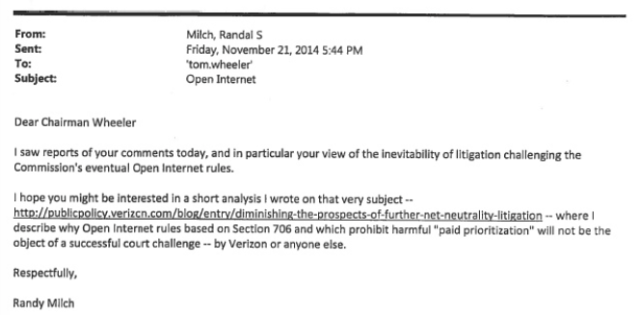In 2010, the FCC issued rules preventing Internet service providers from blocking or discriminating against traffic by relying on Section 706 of the Telecommunications Act, rather than the stronger powers the FCC has under Title II, which covers utilities or "common carriers." Verizon sued and won, with a federal appeals court stating that the FCC could not issue what amounted to common carrier rules without first reclassifying broadband service as a utility, similar to the traditional phone network.
That's why the FCC is now considering reclassifying broadband. It wants the next set of net neutrality rules to survive a court challenge. "We are going to be sued," FCC Chairman Tom Wheeler said last week.
In response to Wheeler's statement, Verizon Executive VP Randal Milch e-mailed Wheeler to say Verizon won't sue if the FCC uses Section 706, even though that's exactly what Verizon did last time. Section 706 requires the FCC to encourage the deployment of advanced telecommunications capability to all Americans, and it can be used to govern broadband providers' treatment of Internet traffic.
Milch's e-mail was made public in an ex parte letter filed with the commission yesterday. Milch wrote that rules based on Section 706 "will not be the object of a successful court challenge—by Verizon or anyone else."

In the blog post Milch's e-mail referred to, Verizon said that Title II regulation "fairly guarantees litigation."
Given that Verizon now wants net neutrality rules based on Section 706, if only to avoid stricter utility regulations, the company probably wishes it hadn't sued to block the FCC's first attempt at net neutrality rules based on Section 706. Verizon's fellow ISPs wish the same. AT&T and Comcast reportedly tried to convince Verizon not to sue over the 2010 rules. ISPs are reportedly furious with Verizon now that it's "victory" in court could backfire in a spectacular way for all broadband providers.
reader comments
87